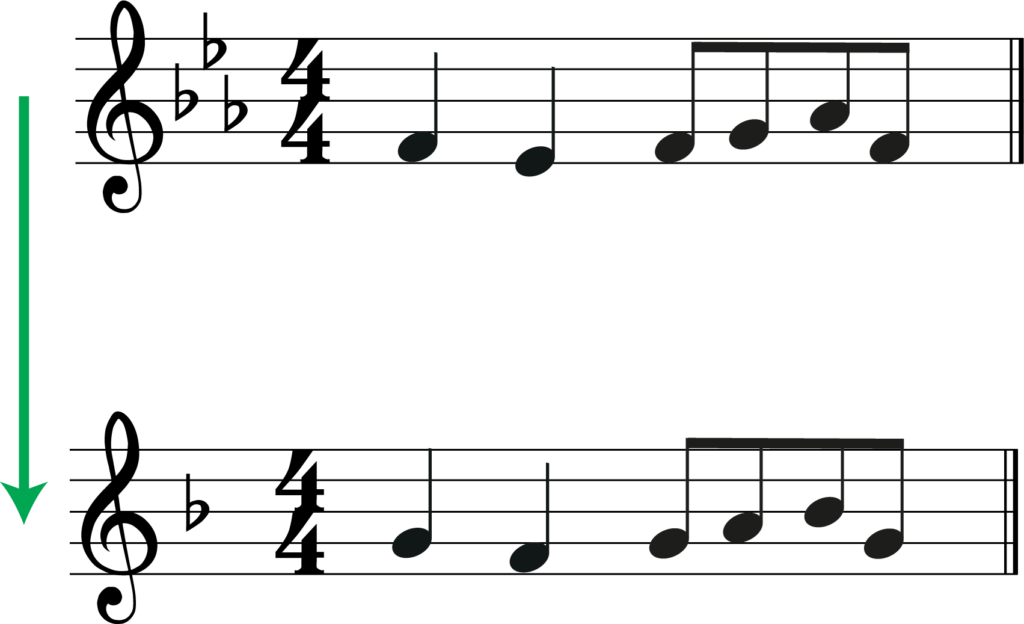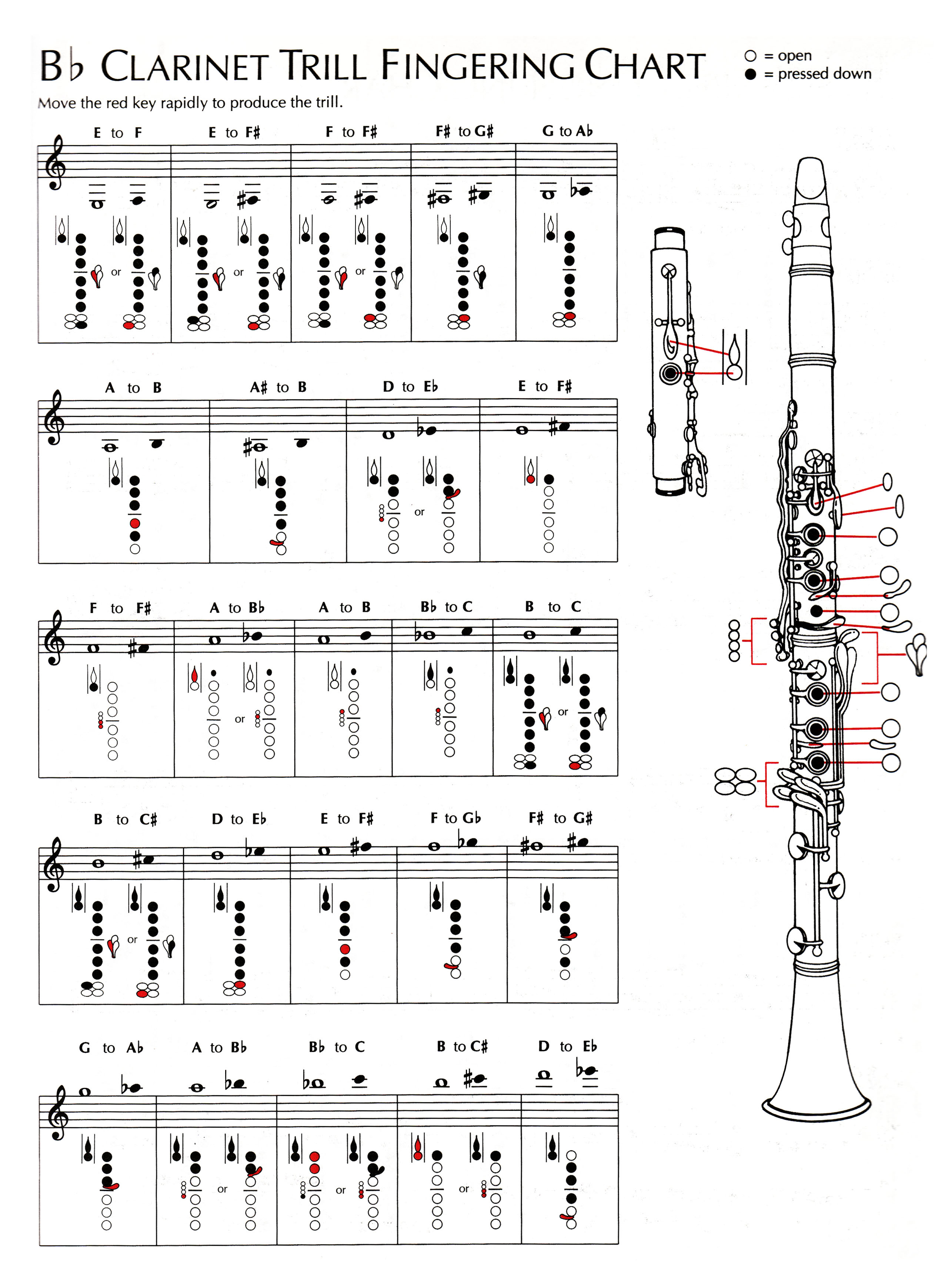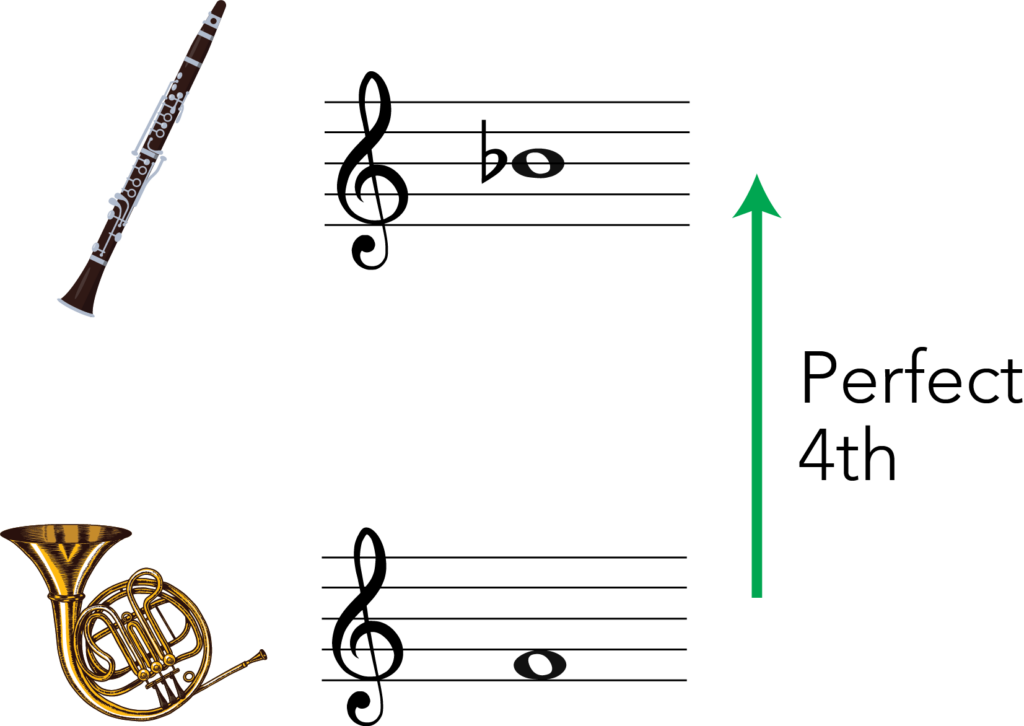
transposing instruments chart Google Search Music theory
Example 10.2.1. Transposing instrument chart for clarinet in B-flat. The four boxes in dark blue will always be the same for all transposing instrument charts. Example 10.2.1A: This row shows three columns: what we see (written pitch), what we hear (concert pitch), and the interval by which the pitch must be transposed for the concert pitch.

How to Transpose Music From C to B Flat 4 Steps (with Pictures)
Calculate the interval from C to the key of the instrument. That is the interval which the instrument transposes. For example, from C to Bb is a descending major second (or ninth). Bb instruments transpose down a major second (or ninth). Eb instruments transpose up a minor third or down a major sixth.

Transposing Sheet music for in bflat, Harp (Mixed Duet
Since we know that the B-Flat Clarinet must read a whole step above C instruments to compensate for its instrument sounding a whole step too low,. TRANSPOSITION CHART. Download and print the following 3-page chart (or print from the PDF available on Canvas) to give yourself practice and a handy chart to refer to in the future when dealing.

Transposition for in A Music Theory Explained
Clarinet Transposition Chart December 7, 2021 / FREE download! This one-page downloadable/printable PDF includes transposition in the following keys: C, Bb, Eb, A, and F. Easily transpose between different auxiliary clarinets! Free - Purchase By jennyclarinet About Jenny My name is Jenny Maclay, but my friends call me Jenny Clarinet.

Sample Fingering Chart Free Download
Clarinet transposition is a concept that every clarinet needs to learn and understand. The clarinet is a Bb transposing instrument. This means that if you play a Bb on the piano, you will need to play C on the clarinet to produce the same sound as the piano.

(BFlat) Concert Pitch Transposition Chart
A Clarinet to B-flat Clarinet. A relatively simple transposition involves moving from Clarinet in A to Clarinet in B-flat. Here is some background info which forms the basis for the transposition procedure: An A clarinet sounds A when it plays written C; that is, it is written a minor third (three half steps) higher than concert pitch.

Transposition for in B flat A Music Theory Guide
Method 1- Move notes up one at a time Have a look at the melody below. The melody is written in key of D major. We could move all the notes up three half steps (semitones), making sure that we take into account the F# and C# notes in the original key. Here is the new melody. As you can see, we now have one flat, so we are in the key of F Major.

How to Transpose Music in 3 Steps nkoda
Clarinet in Eb Clarinet in Bb Clarinet in A Bass Clarinet in Bb Soprano Saxophone Alto Saxophone Tenor Saxophone Baritone Saxophone Horn in F Trumpet in Bb 4 4 4 4 4 4 4 4 4 4 4 4 4 4 4 4 4 4 4 4 4 4 4 4 & ALTO FLUTE Key: G Sounds a perfect 4th lower than written pitch Instrument Transposition Chart Written note Music-Theory-Practice.com.

14+ Fingering Chart Pdf DaleChristine
Common instruments in B flat are: Clarinet in Bb Trumpet Trombone Tenor Saxophone For these instruments, when the player reads a C on the staff and play a C, we hear a B flat. In other words, their written pitch is a major 2nd above their sounding pitch.

Trill Fingering Chart Nanaimo Concert Band
Common instruments in B flat are: Clarinet in Bb Trumpet Trombone Tenor Saxophone For these instruments, when the player reads a C on the staff and play a C, we hear a B flat. In other words, their written pitch is a major 2nd above their sounding pitch.

Transposition Charts For Musicians Yona Marie Yona Marie Music
The clarinet in B flat is the most popular type of clarinet. Like all clarinets, it is a transposing instrument so the note we hear is different to the note the clarinettist plays. When the player reads a C on the staff and play a C, we hear a B flat. In other words, the clarinet's written pitch is a major 2 nd above their sounding pitch.

Transposing Instruments Basics
The most commonly played clarinet is the "B flat" or soprano clarinet. Like the trumpet, tenor saxophone, and soprano saxophone, it is in the key of B flat. If you play the pitch "C" on your clarinet, it will register as a B flat on your tuner. The note C that you play on the clarinet is also called the "written pitch" for the clarinet.

fingering chart B Flat Fingering Chart Spring me
Transposition Chart | How do transposing instruments work? | B-flat Instruments | Q&A | Tips Transposing instruments in B-flat are instruments such as the clarinet, tenor sax, or trumpet that are notated at a different pitch than they actually sound.

Transposition for in B flat A Music Theory Guide
Our key of C Major transposes to a key of D Major, Key of G Major transposes to Key of A Major, key of B-flat Major transposes to the key of C Major, and so on. You may also use this chart as a guide when transposing individual notes on your sheet music. For example, when an F instrument sees a C, it will sound like an F pitch.

Instrument Transposition Chart
Transposition Chart Concert Pitch: Violin, Flute, Oboe C C# Db D D# Eb E F F# Gb G G# Ab A A# Bb B Bb Instruments: Clarinet, Tenor Sax, Trumpet, Baritone T.C., Bass Clarinet D D# Eb E F F# Gb G G# Ab A A# Bb B C C# Db Eb Instruments: Alto Sax, Alto Clarinet, Baritone Sax A A#.

Transposition for in B flat A Music Theory Guide
When a clarinet player plays a written C, his/her clarinet sounds a B-flat. That's why we say that the clarinet is a transposing instrument in B-flat. To be more accurate, not all clarinets are in B-flat: clarinets in other keys (in C, in A, in E-flat, just to name a few) also exist, but the B-flat clarinet is by far the most common variety.